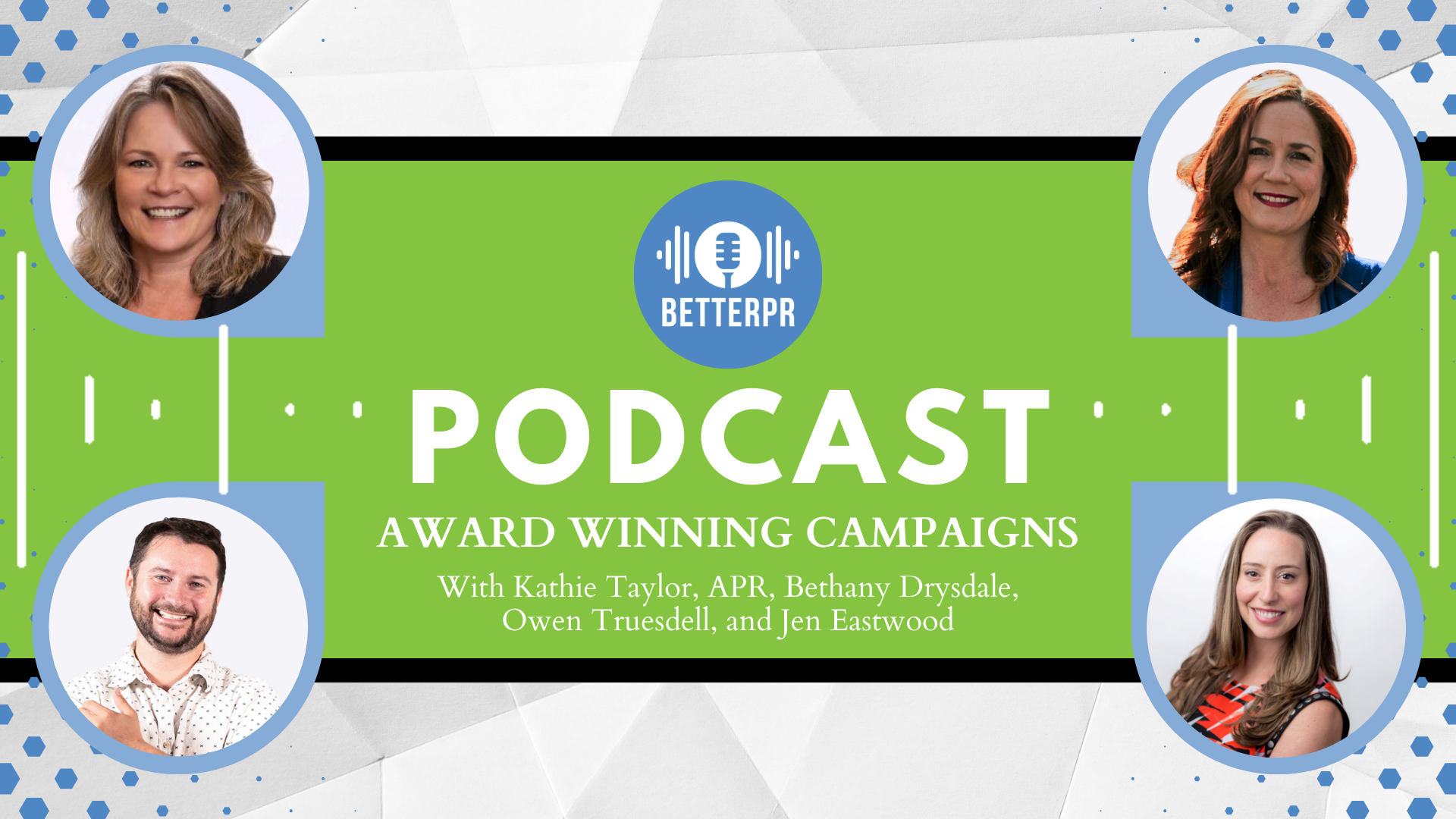Better PR: Award Winning Campaigns
Everyone loves a shiny trophy awarded for a successful campaign, but award-winning campaigns are about much more than the trophy and its accompanying press release.
Successful campaigns achieve tangible results for the client, helping their company achieve their mission and reach success, but also helping the individuals targeted through the campaign. Whether that’s signing people up for health insurance, helping students in need find the educational resources they need, or allowing people to enjoy local events- campaigns are truly for the people.
In this BetterPR podcast episode, Owen Truesdell, VP of Public Affairs for the Abbi Agency, Bethany Drysdale, Manager of Media and Communications for Washoe County, and Jen Eastwood, Director of Public Relations at Good Giant share their insights as to how the Public Relations Society of America’s 4-step process of research, planning, implementation, and evaluation, or RPIE, impacted their successful campaigns in their respective roles.
We’ll break down RPIE after we introduce our speakers!
How our PR professionals used RPIE in their real-life campaigns
Nevada Health Link
Owen Truesdell, VP of Public Affairs for The Abbi Agency, breaks down a campaign they created for Nevada Health Link to get Nevadans to enroll in quality, affordable health insurance in a two and a half month time period. The research piece of RPIE helped them uncover what messaging was going to motivate people to sign up for health insurance and how people made decisions about health insurance. Their research brought them to create a three-tiered approach to their marketing plan that ultimately led them to some of the highest enrollments in Nevada Health Link history, and well-earned recognition at the PRSA Sierra Nevada Chapter Silver Spikes Awards.
2022 Election
Bethany Drysdale, Manager of Media and Communications for Washoe County, often has to look more towards the implementation process of RPIE in her government position, as they don’t always have time to research or plan in a fast-thinking situation, which isn’t to say Washoe County doesn’t have oodles of data at their fingertips. In this instance, during the 2022 election, Washoe County had a camera live streaming the ballot counters while they worked, and one night the cameras went dark. Even though it was rebooted the next morning, the public jumped to outrage and conspiracy due to the camera losing connection. This required crisis communications to act fast to rectify the issue at hand. An info sheet was created, stating what happened, how they fixed it, and how it won’t happen again. The message was spread across all workers and officials, and that was the message that was issued to everyone who asked- never straying from the info sheet created. As Bethany says, it’s not a sexy solution, but it’s one that worked to own the messaging.
Reno Rodeo
Jen Eastwood, Director of Public Relations at Good Giant, uses evaluation to see what works and what doesn’t work year after year for one of the biggest events in Reno, The Reno Rodeo. Evaluation helps them understand what was successful in driving visitors and ticket sales, and what they can change for the upcoming year. They spend year after year looking at qualitative metrics and comparative metrics to see how they are continuing to improve and how they’re finding new ways to talk about the Reno Rodeo and new stories to highlight. The results? A large community event people look forward to year after year, selling out nightly shows since the 100th anniversary of the Rodeo in 2019, and still bringing more people in to enjoy the Reno Rodeo culture with new and innovative methods.
Understanding the RPIE Process
The RPIE process—Research, Planning, Implementation, and Evaluation—serves as a blueprint for PR professionals and marketers to develop campaigns that resonate with their target audience, drive engagement, and achieve tangible results. Let’s delve deeper into each phase:
Research:
Research is the cornerstone of any successful marketing campaign. It involves gathering relevant data and insights about the target audience, market trends, competitors, and industry landscape. By understanding the needs, preferences, and pain points of the target audience, you can tailor their messaging and strategies effectively. Research also helps identify opportunities and challenges that can inform the campaign’s direction.
Planning:
Once armed with valuable insights from research, the next step is strategic planning. This phase involves defining campaign objectives, setting clear goals, and outlining the strategies and tactics needed to achieve them. With this, you can develop detailed plans for messaging, channel selection, budget allocation, and timeline. A well-thought-out plan ensures alignment with business objectives and maximizes the chances of campaign success.
Implementation:
With the plan in place, it’s time to bring the campaign to life. Implementation involves executing the strategies outlined in the planning phase – and without a good plan, implementation is messy. Creating compelling content, designing eye-catching visuals, launching advertising campaigns, and engaging with the target audience across various channels are all tactics that support the strategies you’ve outlined in your plan. Setting out your resources, accountabilities, expected deliverables, budget and timeline are critical pieces of a great implementation. Attention to detail and seamless execution are crucial during this phase to ensure that the campaign delivers the intended message effectively.
Evaluation:
The final phase of the RPIE process is evaluation, where you assess the performance and impact of the campaign against predefined metrics and objectives. This involves analyzing key performance indicators (KPIs), such as reach, engagement, conversion rates, and return on investment (ROI). By gathering data and feedback, you can identify what worked well, what didn’t, and areas for improvement. Evaluation provides valuable insights for future campaigns and helps demonstrate the campaign’s effectiveness to stakeholders.
No matter what organization you work with, the RPIE process serves as a guiding framework for developing successful campaigns that resonate with audiences, drive engagement, and deliver measurable results. Use it to create successful strategies for your clients that gets results, and just maybe, that cool trophy you’ve been eyeballing!

